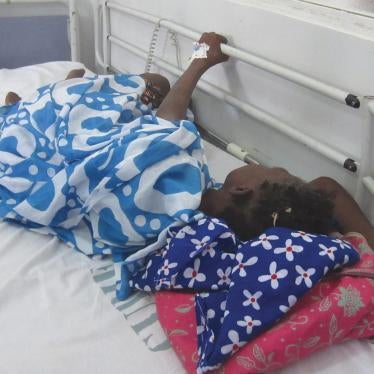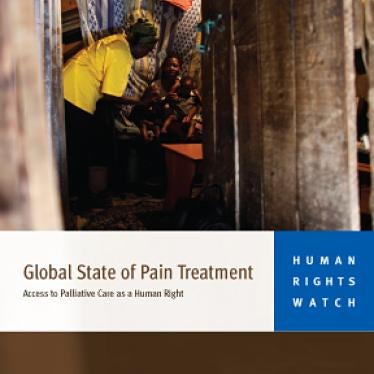(Nairobi) - The Kenyan Parliament’s vote to make cancer treatment free of charge will save lives and promote the right to health, Human Rights Watch said today. The Kenyan government should move quickly to turn the decision into reality, and donors should help fund the effort, Human Rights Watch said.
“The majority of cancer sufferers in Kenya do not have access to the curative or palliative care they need, and children are at a particular disadvantage,” said Juliane Kippenberg, senior children’s rights researcher at Human Rights Watch. “This vote creates new hope for cancer patients and indeed for all Kenyans.”
On November 2, 2011, Parliament unanimously voted through a motion to make cancer treatment free of charge. The government now needs to draw up a policy on this and mobilize financial support for the measure.
An estimated 18,000 patients die of cancer every year in Kenya. Human Rights Watch has documented serious obstacles Kenyan children face in getting cancer care. Lower-level health facilities, including district hospitals, are not equipped to diagnose and treat cancer. For a diagnosis, families are frequently told to travel to one of the few provincial or referral hospitals, a trip that many cannot afford.
The costs of chemotherapy and other cancer treatment are often prohibitive. As a result, children most often do not get the treatment they need. If they do, families often go deep into debt. Human Rights Watch interviewed the father of an 11-year-old boy with Non-Hodgkin’s lymphoma, who had paid more than 448,000 Kenyan shillings (approximately US$4,600) for his son’s treatment, selling land and borrowing money, and yet was unable to pay a pending bill.
Human Rights Watch also found that Kenya has significant challenges in providing palliative care – adequate pain relief, symptom relief, and psychosocial support for patients with life-limiting disease. Since 2010, the Kenyan government has pledged to increase training of physicians in palliative care and to open 10 new palliative care units. But health workers often fail to assess pain in children correctly. When children with cancer are found to be in need of strong pain drugs, such as oral morphine, health workers often deny such treatment because they lack training on providing morphine treatment for children, or they consider the need to use morphine a “defeat.” Oral morphine is available in only a few hospitals across the country.
The vote on free care was taken during a debate in Parliament on a bill to establish a Cancer Prevention and Control Institute. The institute would lead the country’s health response to cancer, including palliative care. It would oversee and coordinate data-gathering, training, prevention, and treatment efforts. The bill is currently before the parliamentary health committee. The plans for the institute and its integrated approach to palliative care would provide hope to many Kenyans, Human Rights Watch said.
In 2008 more than 7.5 million people died worldwide due to cancer, with two-thirds in low- and middle-income countries. In sub-Saharan Africa, cervical cancer is the leading cause of cancer death among women. Globally, while infectious disease deaths are projected to decline by around 7 million a year over the next 20 years, cancer deaths are expected to increase by 4 million annually, according to the World Health Organization (WHO).
Under international law, the Kenyan government must progressively enable its citizens to realize the right to the highest attainable standard of health. It is also obliged to fulfill certain minimum core obligations, including providing healthcare for children and essential medicines. WHO classifies morphine as one of these drugs. International law also emphasizes the essential role of international cooperation to help people realize their full right to health.
WHO has recommended that governments develop national policies on palliative care, integrate palliative care into health services, ensure the availability of opioid pain medicines, and educate health professionals and the public about palliative care. For resource-poor countries, WHO has emphasized the importance of community-based palliative care, which can be provided at relatively low cost.
“This bill provides an opportunity for Kenya to become a leader in addressing cancer and palliative care among sub-Saharan African countries,” Kippenberg said. “Developing strong programs on pediatric cancer and palliative care issues will allow Kenya to pioneer attention to a neglected and devastating health problem.”
For more Human Rights Watch reporting on children’s rights, please visit:
https://www.hrw.org/crd
For more Human Rights Watch reporting on health and human rights, please visit:
https://www.hrw.org/health






